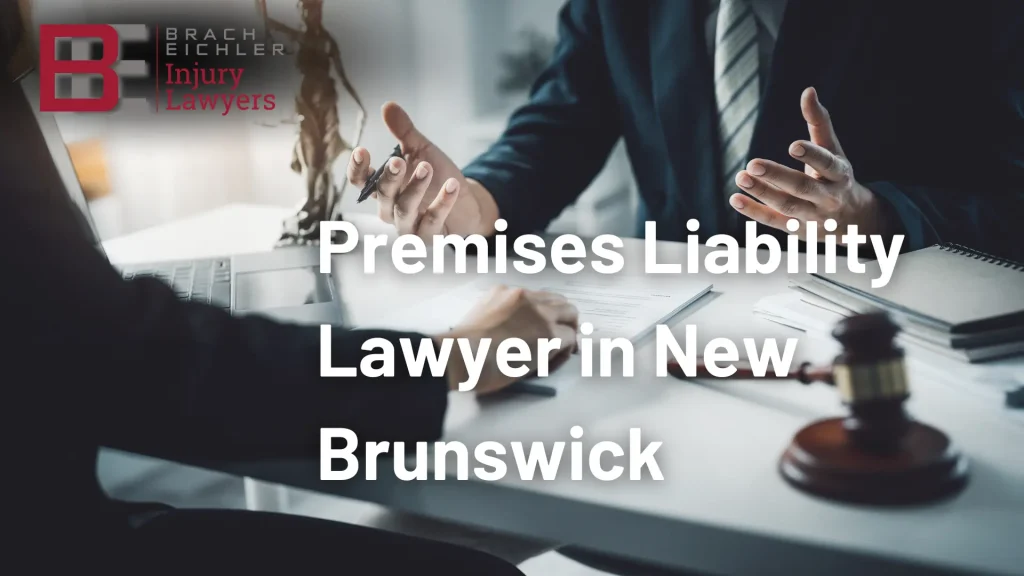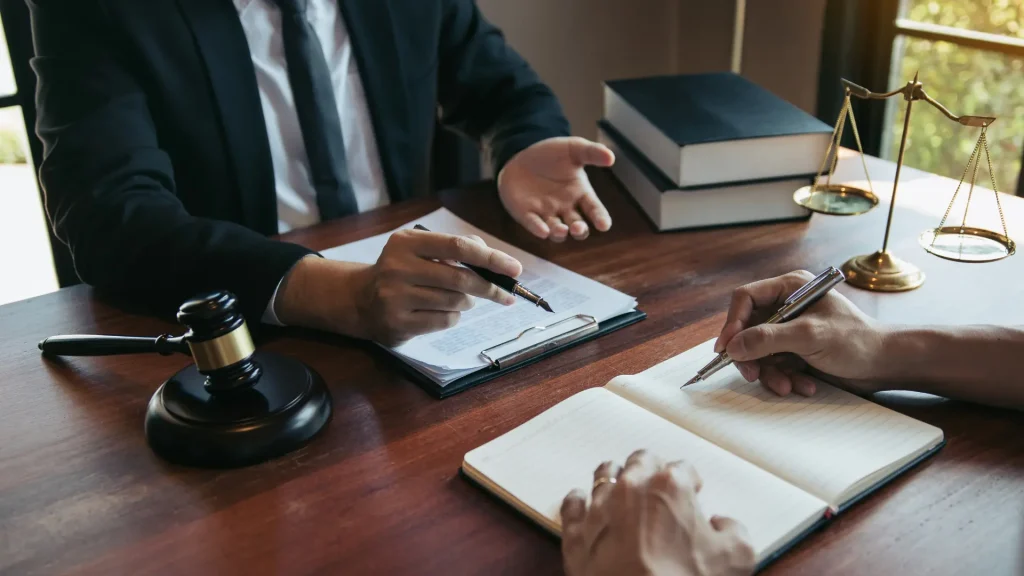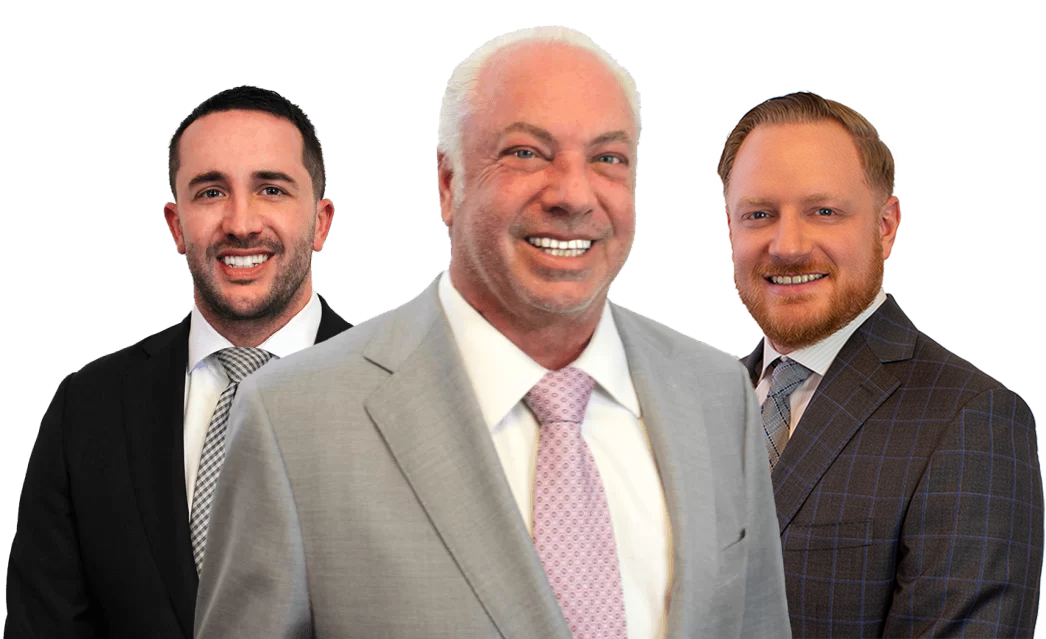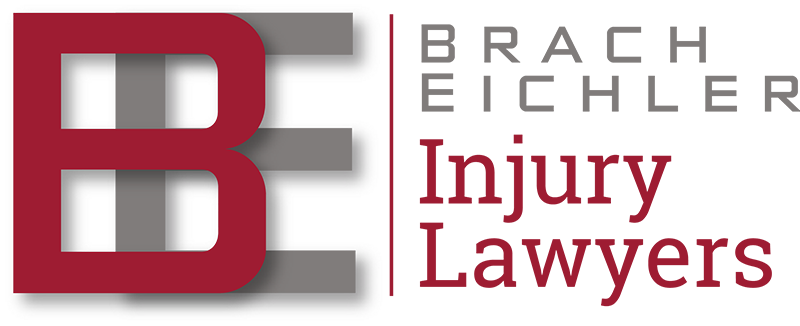 When on a property in New Brunswick, the owner or occupier has a legal duty to keep you safe from harm. Regardless of whether it’s a house, business, parking lot, or school, the duty is the same. If dangerous conditions have caused you injury, the landowner could be financially responsible for your losses. A New Brunswick premises liability lawyer from Brach Eichler Injury Lawyers can help you pursue justice and financial restitution from liable property owners.
When on a property in New Brunswick, the owner or occupier has a legal duty to keep you safe from harm. Regardless of whether it’s a house, business, parking lot, or school, the duty is the same. If dangerous conditions have caused you injury, the landowner could be financially responsible for your losses. A New Brunswick premises liability lawyer from Brach Eichler Injury Lawyers can help you pursue justice and financial restitution from liable property owners.
With over $500 million recovered for injured clients through personal injury claims, we are confident in our ability to pursue your financial compensation. Our track record reflects a long history of successful outcomes for victims of negligence. Landowners should not avoid the consequences when their wrongdoing results in harm. They should take responsibility and pay for the injuries they caused.
Contact our offices online or at (973) 364-8300 for a free consultation with a personal injury attorney in New Brunswick.
Definition of Premises Liability in New Jersey
Every American has a right to own property, but every right comes with corresponding responsibilities and duties. Premises liability refers to a landowner’s general legal obligation to maintain safe conditions for guests on their property. If a landowner negligently creates a hazard or fails to minimize the risk of danger, they can be financially liable for injuries.
The classic example of a premises liability accident is a fall from a slippery floor. Imagine a grocery store employee mops the floor but doesn’t place a wet floor sign. You later walk by, slip on the floor, and break your wrist in the fall. In this scenario, the grocery store owner could bear liability for your injury. They had a duty to minimize your risk, but failed to warn you about the wet floor.
Locations Where Premises Liability Accidents Can Occur in New Brunswick, NJ
Accidents can happen virtually anywhere, so premises liability claims involve a wide range of private and public properties:
- Retail Stores – Retail stores might have wet/uneven flooring or stacks of merchandise that pose a tripping hazard. Customers can also sustain serious injuries from falling or unsecured merchandise.
- Private Residences – Private residences can have hazards like incomplete construction, exposed wiring, or dangerous animals. Property fixtures like swimming pools or trampolines may also pose a risk.
- Parking Lots and Sidewalks – Pedestrians can trip on cracks in parking lots and sidewalks and sustain falling injuries. New Brunswick gets significant snowfall, so icy walkways are a common danger.
- Hospitals – Patients can suffer injuries from falls and dangerous medical equipment in hospitals and other medical facilities.
- Hotels and Resorts – Hotels and resorts can have dangerous facilities due to negligent maintenance, like pools, gyms, and other recreational facilities.
- Bars and Nightclubs – Bars and other places that serve alcohol can be liable for injuries due to over-serving or negligent security.
- Stadiums and Concert Venues – Event goers at stadiums and other large venues can sustain injuries due to improper crowd management practices.
Accidents can happen anywhere, especially when dangerous conditions on someone else’s property create a potential danger to visitors. Staying aware of these risks can help you protect yourself and know when to seek legal help.
The Role of Negligence in New Brunswick Premises Liability Claims
Most premises liability cases concern whether the landowner was negligent in maintaining or securing their property. Proving negligence requires establishing three key facts:
- The property owner owed the victim a duty of care
- The property owner breached that duty through action or omission
- The breach of duty caused the victim’s injuries
A duty of care is a legal standard establishing which actions and omissions would constitute negligence and establish liability. It effectively tells landowners what steps they must take to avoid legal liability for injuries to visitors on their properties.
Duty of Care and Visitor Status
Traditionally, this duty of care depends on the legal relationship between the property owner and the visitor. The law broadly recognizes three types of visitors:
- Invitees are visitors lawfully on the property for the owner’s financial benefit, such as customers or hotel guests. Invitees must receive proper notice of existing hazards, and the owner must regularly inspect for hidden hazards.
- Licensees include visitors to the premises for non-commercial or personal reasons. Houseguests or delivery drivers count as licensees. Licensees must receive notice of known hazards, but landlords do not have to seek out hidden ones.
- Trespassers are unlawful visitors on the premises without permission. Property owners do not owe trespassers a duty of care, but cannot intentionally create conditions to harm them (e.g., booby traps).
In premises liability claims, the first step is proving which (if any) relationship existed between the victim and the property owner. From there, an attorney can argue that the landowner’s conduct fell short of the threshold of reasonable care.
Tenant Responsibility in New Brunswick Premises Liability Claims
Premises liability applies to formal property owners as well as anyone currently in control of the property. In the case of rental tenants, commercial and residential leases typically establish which maintenance/upkeep duties landlords and tenants have. Tenants typically assume responsibility for regular maintenance/upkeep, while landlords are responsible for larger building repairs.
This division of responsibility means that liability usually depends on the nature of the property defect that caused harm. If the injury were from a slippery, recently mopped floor, for example, the tenant would likely be liable. If the injury were from a structural defect, like a collapsed ceiling, the landlord would probably be responsible.
In some cases, both tenants and owners can share liability for injuries due to negligent upkeep. Our experienced personal injury attorneys can identify all potential parties who could have negligently contributed to your injuries, including owners, tenants, repair companies, property inspectors, and more.
Compensation You Can Recover in a Premises Liability Claim
 Premises liability accident victims have a right to seek financial compensation in the form of a settlement. Depending on your injuries and broader circumstances, we can seek compensation for your injury-related economic losses, including:
Premises liability accident victims have a right to seek financial compensation in the form of a settlement. Depending on your injuries and broader circumstances, we can seek compensation for your injury-related economic losses, including:
- Medical bills and continuing medical expenses
- Lost work income and other forms of missing employment compensation
- Reductions in your lifetime earning capacity due to impairment and disability
- Increased living expenses, like childcare or transportation costs
- The cost of home/vehicle modification to accommodate disability
However, injury losses are more than just monetary. Brach Eichler Injury Lawyers can also pursue compensation for the pain and suffering you have experienced because of your injuries. Your suffering is no less severe than your monetary losses and deserves equal restitution.
New Brunswick Premises Liability FAQs
Premises liability claims in New Brunswick overlap with many other legal issues. As such, our clients have several questions concerning the premises liability claims process and liability for property injuries.
Do I Need to Report the Injury Right Away for a Claim in New Brunswick?
The absolute legal time limit for filing a premises liability lawsuit in New Brunswick is two years (NJSA 2A:14-2). There are a handful of exceptions to this time limit, like cases involving minors or offenders who flee the state. Otherwise, the courts will reject any lawsuits filed after two years.
Two years is the legal time limit for lawsuits, but you should report the injury to the insurance company much sooner. The exact time varies depending on the specific policy, but you usually want to report the injury within 30 days. Insurance companies place greater scrutiny on delayed claims, so the earlier you start, the better. Don’t wait to speak with a premises liability lawyer. New Brunswick has trusted legal professionals ready to help you understand your rights.
What Happens if I Was Partly at Fault for the Accident in New Brunswick?
New Jersey’s comparative negligence laws allow you to recover compensation for injuries even if you are partially liable. The catch is that any final settlement or verdict will be diminished according to your percentage of fault. So, if your fault is 30 percent and total losses are $100,000, you would receive $70,000. This comparative negligence system ensures that parties in personal injury lawsuits only pay for the portion of injuries they are directly responsible for. Injury victims in New Jersey cannot recover damages if they are more than 50 percent at fault.
Can I File a Premises Liability Claim Against My Landlord if I Was Injured in My New Brunswick Apartment?
All residential leases in New Jersey contain an implied warranty of habitability – a guarantee that the landlord will keep the property safe and in livable conditions. Apartment owners in New Brunswick have a legal obligation to maintain vital facilities in their units that are in line with local building codes. Landlords who fail to maintain their properties to current building and fire safety codes can be liable for tenant injuries.
Contact a New Brunswick Premises Liability Attorney from Brach Eichler Injury Lawyers
A single bad accident can change your life forever, but there is a path to justice and closure. Brach Eichler Injury Lawyers can stand at your side and hold irresponsible property owners accountable for their wrongdoing. The longer you wait to take action, the harder it will be to recover your losses, so don’t hesitate. Contact our New Brunswick office today or call (973) 364-8300 to speak to a New Brunswick premises liability attorney.
We proudly serve clients in Middlesex County, Mercer County, Somerset County, and surrounding areas. With a free initial consultation offered by our New Jersey personal injury lawyers, you have nothing to lose by reaching out. Let’s discuss what our team can do to help you fight for the fair compensation and justice you deserve while you focus on healing.
Written by: Brach Eichler Injury Lawyers Last Updated : August 4, 2025We are the trial attorneys with the experience and knowledge to get you the results you deserve. At Brach Eichler Injury Lawyers, we take time to get to know you, as well as your case. We are committed to excellence. It is important for our team to understand your fears, concerns and expectations. We are always available to answer any questions, and are willing to come to you if you are unable to come to us.
Contact Your New Jersey Personal Injury Attorneys
